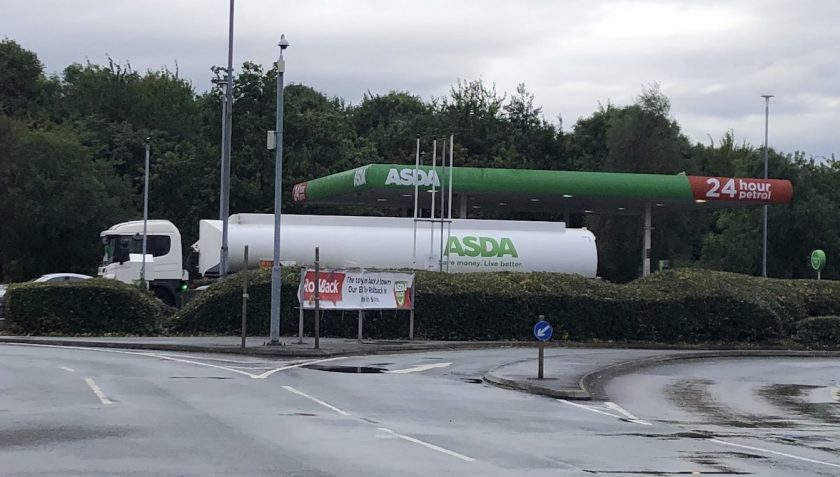Fuel Industry: “Demand for petrol will return to its normal levels in the coming days”

Demand for petrol will “return to its normal levels in the coming days” the fuel industry has said.
An HGV driver shortage is hampering supply chains across a range of industries and is now impacting on fuel deliveries.
Many petrol stations across the UK were left without fuel over the weekend due to panic buying.
Across Deeside petrol stations were busy on Monday but the queuing witnessed over the weekend appeared to have eased, helped by limits on the amount of fuel that can be bought at any one time.
Head of the UK Petrol Retailers Association Brian Madison said the panic was triggered by a leaked report last week that was then broadcast.
Mr Maddison said a “whistleblower leaked a confidential BP report to the Cabinet meeting on the 16th of September when it was picked up by our main broadcaster and broadcast last Wednesday and immediately what happened was panic buying from Thursday, Friday, Saturday.”
The UK Government announced on Monday further measures to help further ease supply chain pressures and spikes in localised demand for fuel, including the approval to put on standby a pool of military drivers and extension to specific HGV licences.
British Army tanker drivers are being brought to “a state of readiness” in order to be deployed if required to deliver fuel to where it is needed.
Ministers say the move will provide “further reassurance that fuel supplies remain strong.”
“The military drivers will now receive specialised training before deploying, enabling them to seamlessly work with industry to address the supply chain pressures.”
The Military Aid to the Civil Authorities (MACA) request was issued by UK Government Business Secretary Kwasi Kwarteng on Monday.
Ten fuel companies issued a joint statement on Monday saying: “There is plenty of fuel at UK refineries and terminals, and as an industry, we are working closely with the government to help ensure fuel is available to be delivered to stations across the country.”
“As many cars are now holding more fuel than usual, we expect that demand will return to its normal levels in the coming days, easing pressures on fuel station forecourts. We would encourage everyone to buy fuel as they usually would.”
“We remain enormously grateful to all forecourt staff and HGV drivers for working tirelessly to maintain supplies during this time.”
Wales’ Health Minister Eluned Morgan said many emergency workers have suffered delays due to queues for fuel, In a post on social media, she said:
“Please only refuel if you need to! Panic buying is impacting emergency workers who are in need of petrol to get patients to hospitals. Many are being delayed trying to pass queues.”
“Keeping roads clear is essential for emergency services, hindering them poses a public safety risk.”
The British Medical Association has called for healthcare workers to be given priority access to fuel so they can get to work and reach patients. Dr Chaand Nagpaul, BMA council chair, said:
“Emergency and essential workers rely on fuel both to travel to work and for their work itself – whether this is to get to hospitals, practices and other healthcare settings, or for ambulances to reach people in urgent need of care and GPs to visit very ill patients at home.”
“Everyone will have their own reasons for needing to fill up, but as pumps run dry there is a real risk that NHS staff won’t be able to do their jobs, and provide vital services and care to people who urgently need it.”
“While the (UK) Government has said it is putting plans in place to alleviate the shortage of HGV drivers to transport fuel, the results of this won’t be immediate.”
“Healthcare and essential workers must therefore be given priority access to fuel so they can continue their crucial work and guarantee care to patients.”
First Minister Mark Drakeford said urgent talks are taking place to make sure fuel is fairly distributed across Wales.
Mark Drakeford says Welsh Government officials are looking at convening an emergency group to take those steps in the wake of the fuel issues.
He told ITV Wales, “I’ve been in discussions this morning (Monday) with Welsh Government officials. ”
“They are talking this morning with the UK Government and with BEIS (The Department for Business, Energy and Industrial Strategy) to make sure we understood the plans that they are putting in place.”
“One of the great things we have on our side in Wales is that we can usually do things quickly. There’s not many people you have to contact; we can do that as quickly as is necessary.”
“We need to understand before we do the basis from which we will be working, what is the UK government’s plan, how do they intend to deal with the crisis that they have, they have presided over in one of the most basic things that our country has to rely on to keep going.”
Spotted something? Got a story? Email: [email protected]
Latest News
